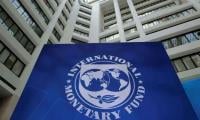ISLAMABAD: Pakistan has made a request to the visiting IMF mission to further slash down the FBR’s annual target second time by over Rs300 billion, bringing it down from Rs5.238 trillion to less than Rs5 trillion mark, The News has learnt.
However, this possible ‘fiscal adjustment’ will be linked with the government’s ability that how much it will be able to jack up on account of non-tax revenue target for the current fiscal year. The FBR authorities told the IMF team that realistically speaking they could not collect more than Rs4.6 or Rs4.7 trillion. It is yet to be seen how much the IMF will agree to relax the target. The IMF might allow the FBR to collect Rs4.938 trillion after holding more talksin the next 10 days.
This non-tax revenue can be increased through accelerating privatisation proceeds and windfall gains through one-off in shape of renewal of licences of mobile operators and increasing profits of State Bank of Pakistan (SBP).
The IMF in its initial response apprised Pakistani authorities that it was not good omen for the country’s economy to increase reliance on “one-off” items instead of depending upon the permanent increases in tax collection. “This one-off might evaporate next fiscal year so the FBR should focus on bringing untapped sectors fully into tax net,” official sources quoted the IMF high-ups as saying during the preliminary round of talks that kick-started here in Ministry of Finance on Monday in the absence of the FBR Chairman Shabbar Zaidi who is on leave on medical grounds for indefinite period. The FBR chairman will take final decision about his stay or quitting this position after consulting his doctors in next 15 days. However, the government has started searching for a new FBR chairman and different names are under consideration including Tariq Pasha, Hasan Mujtaba Memon and Muhammad Jehanzeb Khan.
Adviser to PM on Finance and Revenue Dr Abdul Hafeez Shaikh and Governor State Bank of Pakistan (SBP) Dr Reza Baqir led Pakistani side.
The FBR had initially envisaged tax collection target of Rs5.550 trillion on eve of last budget that was revised downward to the tune of Rs5.238 trillion after completion of first review under $6 billion Extended Fund Facility (EFF). On eve of kick-starting talks for the second review, the FBR made formal request for second time downward revision of the FBR target with the argument of slowdown of the economy and severe compression of imports.
When contacted, the Finance Ministry’s Special Secretary Omar Hameed Khan, who is also official spokesman, said that non-tax revenue target was budgeted at Rs1,162 billion for the current fiscal which would now be revised upwards to Rs1,400 billion.
However, official sources said the Ministry of Finance was pitching up even more target to non-tax revenue collection as the increased non-tax collection will help compensate the FBR shortfall in the current fiscal year.
The FBR spokesman Dr Hamid Ateeq Sarwar said reduction in taxes, especially on imports, could be introduced.
Meanwhile, in an official statement issued on Monday, Ministry of Finance said that the outcome of stabilisation policies, agriculture sector interventions, rigorous monitoring at federal/provincial levels and favourable weather will bring in better results in easing out inflation and sustain the economy towards growth and productivity in the coming days.
Adverse effects of pre-monsoon rains on wheat crop, disruption of supply chain of essential items due to harsh winters and thick fog, delay in harvest and arrival of crop in the market and lower production of vegetables, including tomato in Sindh, led to a higher food inflation but the change of weather and better supply of potatoes, tomatoes and onions should result in smooth supply and decrease price pressure, said the Finance Division in an official statement.
It noted that another factor contributing to higher inflation was the global price impact due to international commodity prices like palm oil increased by 43.9 percent, Soybean oil by 12.8 percent, crude oil by 16.6 percent, etc. in December 2019 over December 2018 which also pushed up the domestic prices. Downward trajectory in crude oil in the market will result in downward pattern in domestic prices in coming months.
Awami Muslim League chief appeared in the court with his lawyers Sardar Raziq and Sardar Shehbaz
Board meeting also allowed increase in business center and commercial area of hotel plots from 5 to 10 percent along...
Foreign exchange reserves currently stand at $8 billion, while Pakistan would also receive $1.1 billion IMF tranche:...
CM directed that the enforcement authorities be made functional in six months, and legislation in this regard be...
Pakistani soldiers and policemen stand guard outside the Haripur central jail. — AFP/FileWASHINGTON: The Pakistani...
Establishment Division has also issued an NoC to fill 465 civilian posts in the Ministry of Defence and 11 posts in...







